By: Esther Kibe MA, Ilhan Ali Salah MA Candidate, & Moses Osiro MA
During the last decade in Eastern Africa, Shalom-SCCRR has empowered over 10,000 women with high quality conflict transformation skills, peacebuilding techniques, resource capacities in livelihood resilience, and other relevant interventions, essential to resolving all forms of manifest and structural violence.
“Women and their children, far too frequently, have had to endure different violent conflict situations in the slums, and most of the time, they have no one to turn to. These desperate situations have seen some of us lose hope owing to the sufferings we continue to face. We appreciate the visionary Shalom Empowerment Center’s (SEC) presence in our area, which has produced a beacon of hope in and for us. We can attest to the difference this empowerment has had in our lives. Our understanding of the various forms of violence – causes, and persistence – women face in this slum environment has been enhanced. We can now respond pro-actively and competently, bringing about lasting change.” Ms. Eunice Oyaro is a community leader from Dagoretti Informal Urban Settlements.
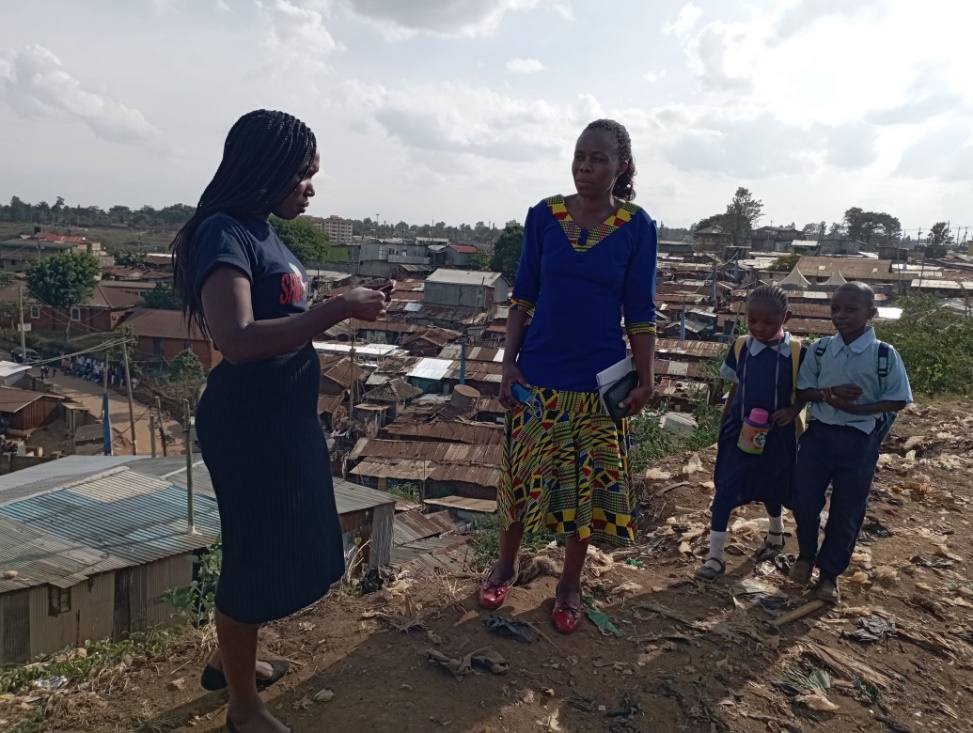
Violent conflict often exposes and exacerbates the general gender-based inequalities and strong gender discrimination within the society. The net effect of these gender disparities translates to women and children being the most affected in conflict situations. Be that as it may, women, despite being victims, can also be active agents perpetuating conflict. Without denying the role women often play in conflict generation and implementation, women’s roles in conflict transformation and peacebuilding are, more often than not, neglected. This is largely owing to gender inequalities that stem from physical, cultural, and social factors.
Much like marginalized areas that are usually susceptible to conflict, the narrative remains the same in Nairobi’s urban informal settlements (slums). There exist various extreme forms of violence meted against women and children in these areas. Yet, the same victims are not included in the post-conflict reconstruction stage, nor are the negotiations required to reach it. It is, therefore, imperative to pursue initiatives geared explicitly towards recognizing and enhancing women’s capacities in post-conflict reconstruction as active participants and negotiators in the overall peacebuilding process.
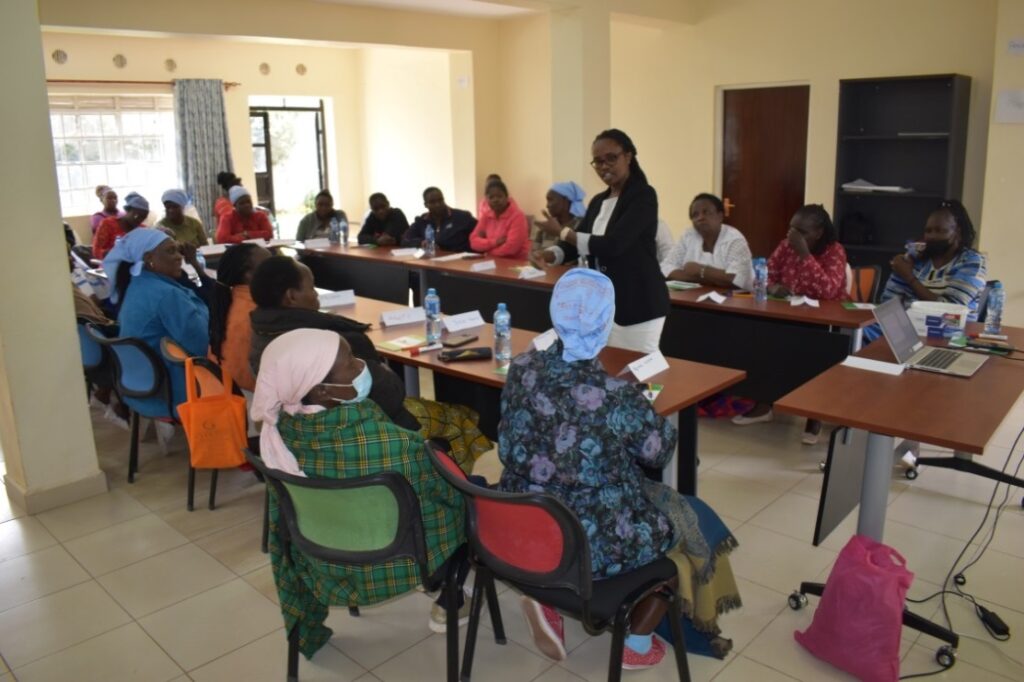
In response and recognition of the aforementioned maxim, Shalom-SCCRR has continued to make great strides in training women on conflict transformation and peacebuilding. One of those achievements is the Shalom Empowerment Center (SEC), established primarily to address violence against women and children. SEC is strategically situated on the outskirts of Nairobi, where ten informal urban settlements or slum areas interface with or are close to each other.
These slum areas include Dagoretti, Kibera, Huruma, Kariobangi, Kawangware, Mathare, Riruta, Waithaka, Kangemi, Korogocho and Mtego.
We have empowered women from these marginalized areas with analytical skills and Peacebuilding techniques for Conflict Transformation and Reconciliation.
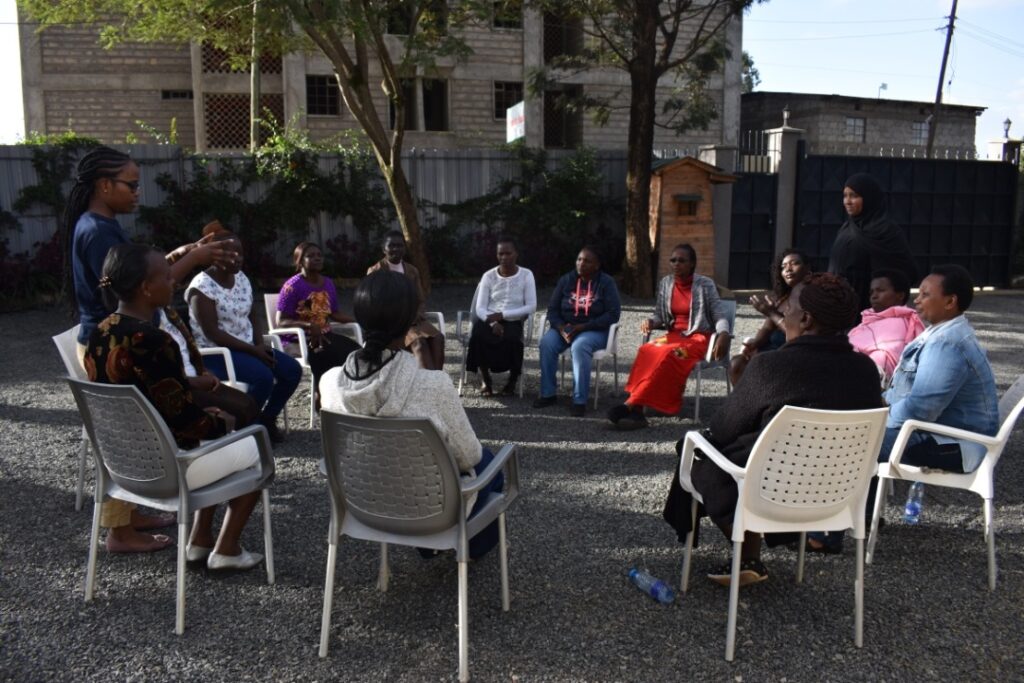
The main goal is to encourage the active involvement of women from these areas in post-conflict reconstruction phases such as the planning, implementation, as the actual peace reconstruction. More women (43% in Shalom-SCCRR Peacebuilding projects) are active negotiators in peace processes at the grassroots level within their traditional ethnic communities in the semi-arid areas of Northern Kenya and in the Urban Informal Settlements.
We have empowered women on The Role of Women in Conflict, and Peacebuilding; and Conflict Negotiation. The essence of negotiation is to encourage and increase communication patterns between and/or among disputants to enable them to arrive at solutions of mutual benefit. Urban informal settlements (slums) are usually susceptible to conflict issues largely owing to the inter-ethnic and inter-religious composition of community members living in the slums. Therefore, such conflict issues require an intervention strategy that strives to rebuild and preserve relationships, improve communication, and provide mutually accepted outcomes that guarantee sustainability in decisions made.
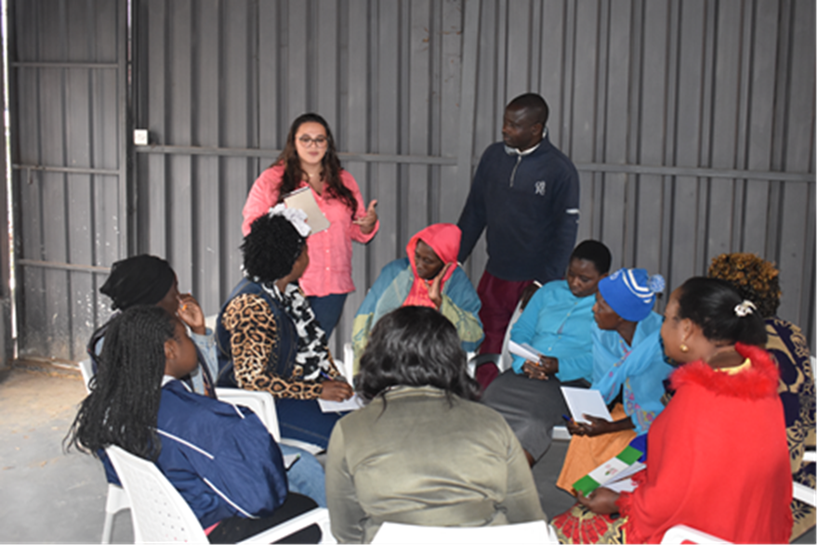
The complex and dynamic nature of these conflict issues is further compounded by gender biases in which women are the most affected. However, up to now their inclusion in the post-conflict reconstruction process is quite limited or neglected. The trainings have been an empowering opportunity that allowed us to delve into the role and participation of women in conflict transformation and peacebuilding, procedures and skills in negotiation,and negotiation strategies specifically tailored for women.
Appreciating the training workshop, Ms. Kornie Wesonga, a key influential opinion shaper from Riruta, stated; “As women from the urban informal settlements, we appreciate Shalom for the remarkable high quality of empowerment to women in Nairobi slums. Through their trainings, we have become more aware of women’s role in peacebuilding and decision-making processes within our communities’ local structures and other public institutions. Many women in our localities have been victims of all forms of violence. Unfortunately, some of us [women] have been used as perpetrators of ethnic violence where our fellow women and children are the primary victims. We therefore recognize and feel the commitment to individually and collectively be agents and drivers of peace in our communities.”
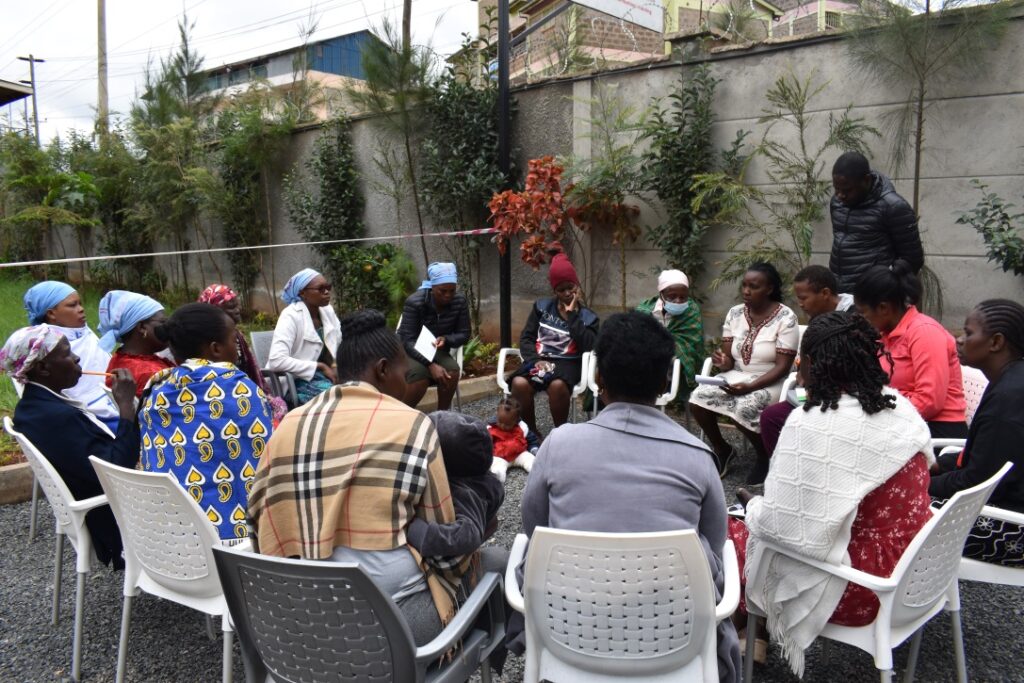
With this caveat in mind, Shalom-SCCRR has made unparalleled progress in capacity-building women through training workshops in order for them to utilize their increased knowledge and skills to effectively address conflict, more so, towards women and children. In doing this, Shalom-SCCRR is providing not only a platform through which women can learn the skills of negotiation techniques as a conflict intervention strategy, but also an opportunity for women to practice and be recognized as active agents in the post-conflict reconstruction within peacebuilding programs in their respective communities.
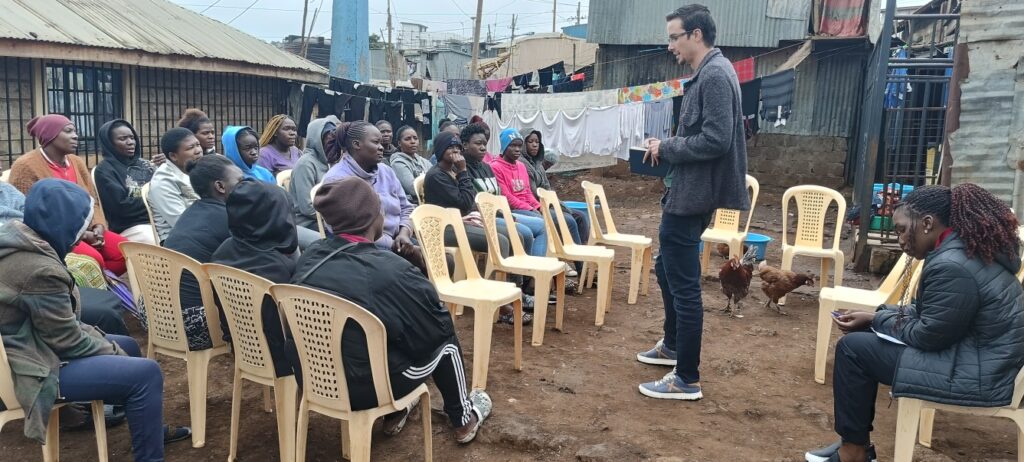
While much work remains in achieving a paradigm shift vis-a-vis the recognition and inclusion of women as active agents in post-conflict reconstruction within the urban informal settlements (slums), Shalom-SCCRR has reaffirmed its commitment by continuously training a higher ratio of women in these locations. Through the much-needed support given by our donors and friends, we will continue to reach out and train more women to be leaders, empowering marginalized women to take up proactive roles in peacebuilding for the betterment of their communities.
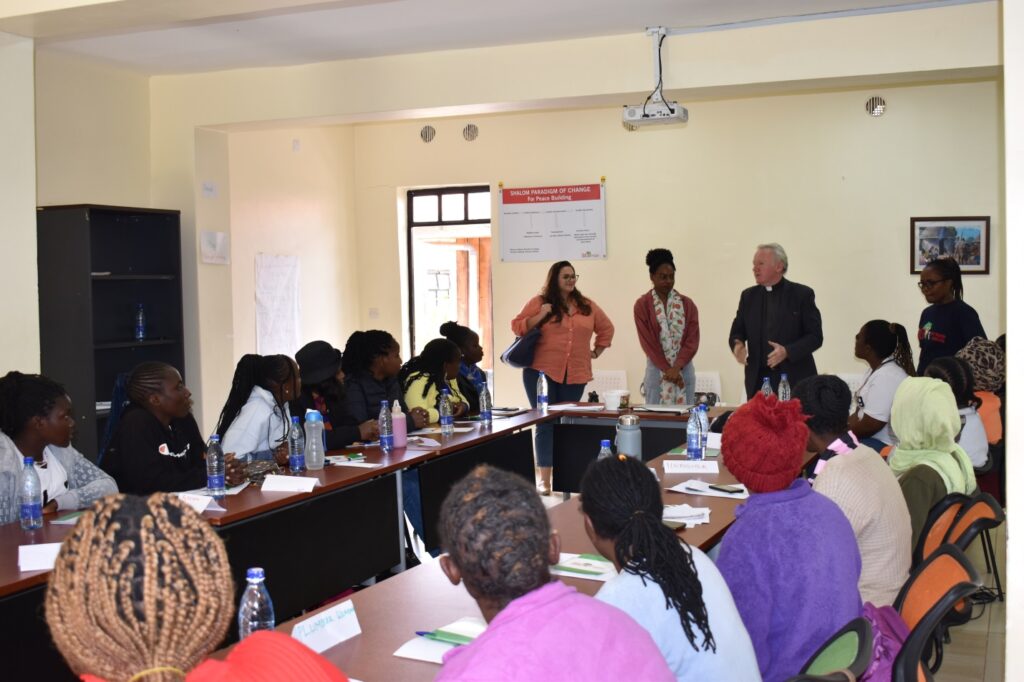
Shalom-SCCRR firmly believes that empowering women with conflict analytical skills and peacebuilding techniques is vital to building sustainable peace and development in our communities. We are contributing to a more inclusive, equitable, and peaceful society by amplifying women’s voices, knowledge, and skills. This augments Ellen Johnson Sirleaf’s (Former Liberian President and Mo Ibrahim Foundation Prize laureate) aspiration, who advocated that;”it is my hope that women and girls across Africa will be inspired to break through barriers and push back on the frontiers of life’s possibilities.” Theory without practice is empty and practice without theory is blind; Shalom-SCCRR believes in walking the walk with the best of theory and expertise in good practice! Walk with us.
Authors:
Esther Njeri Kibe MA, Shalom-SCCRR, Women & Marsabit Projects Officer
Ilhan Ali Salah, BA (MA Candidate), Shalom-SCCRR In-Training Capacity Program
Moses Osiro MA, Shalom-SCCRR Projects Assistant
RELEVANT LINKS
- Shalom-SCCRR. (2022). Shalom Empowerment Center (SEC) Addressing Violence against Women and Children: Concept Document. https://shalomconflictcenter.org/eastern-africa-shalom-empowerment-center-sec-addressing-violence-against-women-and-children-concept-document/
- Moran, M. (2022). Shalom Empowerment Center opens in Nairobi, Kenya. https://www.indcatholicnews.com/news/45158
- Otsieno, J. & Kibe, E. (2022). Shalom Empowerment Center (SEC) Addressing Violence against Women and Children: A Unique Shalom-SCCRR Initiative Opened. https://shalomconflictcenter.org/shalom-empowerment-center-sec-addressing-violence-against-women-and-children-a-unique-shalom-sccrr-initiative-opened/
- Tembo, E. (2023). St. Josphat’s House (Kabiria-Riruta), A Place To Go; Some Shalom-SCCRR Projects in Action. https://shalomconflictcenter.org/st-josphats-house-kabiria-riruta-a-place-to-go-some-shalom-sccrr-projects-in-action/
- Otsieno, J. (2023). Empowering Women to Transform Conflict with Expertise: Shalom-SCCRR’s Initiatives in Conflict-Affected Areas of Northern Kenya. https://shalomconflictcenter.org/empowering-women-to-transform-conflict-with-expertise-shalom-sccrrs-initiatives-in-conflict-affected-areas-of-northern-kenya/
- Kibe, E & Otsieno, J. (2023). Shalom-SCCRR continues to Empower Women with Conflict Analytical Skills and Peacebuilding Techniques in Marginalized Environments. https://shalomconflictcenter.org/happy-international-womens-day-4/
- Shalom-SCCRR. (2023). Shalom Empowerment Center (SEC) 2022 Results & Achievements. https://shalomconflictcenter.org/shalom-empowerment-center-sec-2022-results-and-achievements/
- Wamae, J. (2020). Shalom-SCCRR’s Contribution to Women in Conflict Transformation and Peacebuilding. https://shalomconflictcenter.org/shalom-sccrrs-contribution-to-women-in-conflict-transformation-and-peacebuilding/
- Shalom- SCCRR. (2023). 2009-2022 Shalom-SCCRR Results and Achievements.https://shalomconflictcenter.org/wp-content/uploads/2023/06/13-Years-of-Shalom-SCCRR-2009-2022-SV-20230624.pdf
- Shalom-SCCRR. (2023). Prof. Wanakayi K. Omoka’s Understanding of the Philosophy and Work of Shalom-SCCRR Recollected; Augmented with 2022 Results by the Dept. of Monitoring, Evaluation, Research, and Learning (MERL). https://shalomconflictcenter.org/recalling-prof-wanakayi-k-omoka-phd-understanding-of-the-philosophy-and-work-of-shalom-sccrr-augmented-with-2022-shalom-sccrrs-achievements-and-results/
- Devine, P. R. (2023). Shalom-SCCRR Chairman’s Report on Progress and Achievements in 2022. https://shalomconflictcenter.org/chairmans-report-on-progress-and-achievements-in-2022/
- Awed, A. (2021). The Girl-Child: Shalom-SCCRR Impacting Education & the Lives of Young Girls in Marginalized and Remote Locations in Eastern Africa. https://shalomconflictcenter.org/the-girl-child-shalom-sccrr-impacting-the-lives-of-young-girls-in-marginalized-and-remote-locations-in-eastern-africa/
- Shalom-SCCRR, Who We Are; 2022-2023-Synopsis. https://shalomconflictcenter.org/shalom-sccrrs-who-we-are-2022-2023-synopsis-2/

